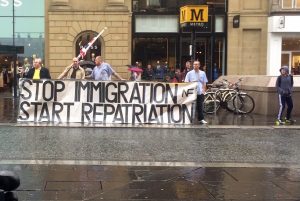
The Guardian piece put a persuasive case for seeing bigotry at the heart of the support for Brexit. It is persuasive but not totally compelling, in that I know people who voted Leave out of a sense of alienation or wanting to waive two fingers at politicians, and others who voted Leave because life has been very tough and they felt that “something has to change” — without thinking too closely of the possibility of things changing for the worse.
And the Daily Mail ran one story appealing for volunteers to help in the NHS, and another proudly proclaiming that 11,000 people had come forward.
What’s intriguing about the Daily Mail story is that the claim has been that “immigrants are taking our jobs”. Though the reality is that immigrants also boost the economy and therefore create jobs, this has been a real fear. But Brexit is leading to staff shortages in the NHS, and the Daily Mail is proud of people volunteering to plug the gap, then something else is going on. Volunteers are not paid. The Daily Mail initiative has turned “immigrants taking our jobs”, which sounds like an economic argument, into “we should be prepared to work for nothing”, as a price (apparently) gladly-paid for getting rid of foreigners.
This doesn’t connect with the friends who voted Leave out of a desire to waive two fingers at politicians or of desperation. It ignores them. It puts a thinly-disguised xenophobia centre-stage. The brutal reality is that the 11,000 “volunteers” who can afford to work for free in the NHS, are not the people who have been suffering financially. They are not the people who have taken a pounding through austerity, globalisation and changes to benefits.
There is something shameful about people voting Leave out of xenophobia, even if it is in polite dress. There’s something much more shameful in xenophobia being the excuse to ignore those who voted Leave out of genuine distress.
This might sound fanciful, but look at what Brexit has done to our political processes. The housing crisis — both in terms of prices and homelessness, the crisis in mental health provision, the “gig economy”, the failings of Universal Credit are all really important, but have been pushed off the agenda, and out of Government action, by Brexit.
I fear that The Guardian is right about the real role of xenophobia in building support for Brexit, but it is also fuelling support for Brexit by fuelling the frustrations of people who voted Leave because they felt ignored.
I don’t have much sympathy for the xenophobes, but we must find the energy to respond to those who’ve felt ignored. From a Liberal Democrat perspective, I can argue that lots of Liberal Democrat policy is very relevant here, but this is not a time to stand on party loyalty — cross-party action to engage with those who have been pushed to the margins is needed as much as cross-party action to stop the madness of Brexit.
The day after that Guardian article, Sajid Javid was on the Today programme speaking against freedom of movement, subsequently saying it should end whatever the Brexit deal. Ignoring the economic case for free movement, that adds weight to the sense that this really is about xenophobia, and adds to the sense that the fantasy of immigration is being given priority over the reality of economic exclusion.
In the background, there’s significant evidence of support for Brexit being strongly linked to xenophobia.
There’s a post-Christmas follow-up to this. A tweet from the Home Office on 27 December said “EU citizens and their families will need to apply to the EU Settlement Scheme to continue living in the UK after 31 December 2020” and pointed people to the relevant page of the government web site. Not good in the season of goodwill. More to the point, as we are still talking about what Brexit looks like, this sounds horribly as though the government’s assumption is that people’s anxieties over Brexit will be assuaged by being tough on citizens of other EU nations who have been living in, and contributing to the UK for years.
And on 28 December, Sajid Javid declared a “major incident” over people trying to cross the Channel in small boats — apparently 221 since the start of November. While that is undoubtedly a significant humanitarian issue, the language of a “major incident” to refer to people crossing the Channel by boat sounds more like an invasion. It’s hard not to read that as mobilising memories of the legacy of threatened wartime invasion to get support for Brexit in a way completely out of step with reality.